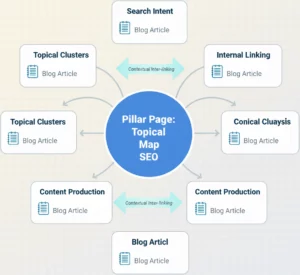
The keyword strategy is an essential element of any organic SEO campaign. It’s the foundation on which a web SEO agency builds and optimizes a site to improve its visibility in Google’s search results. But what is a keyword strategy? And how can it help your site reach the top positions in search results?
Table of Contents
ToggleWhy Keyword Strategy is Crucial for your Organic SEO
The keyword strategy involves identifying and analyzing the keywords that your target audience uses to search for your products or services. By incorporating these keywords into your content, you can improve your site’s organic SEO. But you also attract more traffic and increase your chances of conversion.

In addition to this, a well-implemented keyword strategy can help establish your authority in your field. Google sees that your content is regularly updated with relevant and well-targeted keywords. It may consider your site as a reliable source for users. Thus, your site’s ranking will be improved.
Moreover, creating content rich in relevant keywords can help engage your readers. For example, if you run a e-commerce site that needs good SEO, you can create lifestyle blog posts. These types of content can engage your readers and allow you to fit in a maximum number of keywords. This makes them stay longer on your site and come back.
The Importance of Keyword Research
Keyword research is an essential part of creating an effective keyword strategy. This involves finding out what keywords your target audience uses when they search for products or services similar to yours. It is a crucial step to understand how you can better position your site on Google.
Keyword research can be done in different ways. You can use online keyword research tools. These can provide you with information on a keyword’s popularity, its competitiveness, and its relevance to your business. Another option is to check your competitors’ sites to see what keywords they are using. You can also directly ask your customers what terms they searched to find you.
Once you have a list of relevant keywords, you can start incorporating them into your content. However, the use of keywords should be natural and relevant. Keyword stuffing, or the excessive use of keywords in your content, can be penalized by Google and harm your SEO.
Refine your keyword strategy
Next, you need to regularly review your keyword strategy. Keyword trends can change over time. So, what works today may not work tomorrow. By keeping an eye on keyword trends, you can adjust your strategy accordingly. In this way, you ensure that your site remains relevant and visible to your target audience.
Finally, it’s crucial to keep in mind that even though a well-executed keyword strategy can improve your site’s organic SEO, it should not be your only SEO strategy. A comprehensive approach to SEO is necessary to achieve the best results. This includes on-page optimization, link building, and social media optimization.
How to Develop an Effective Keyword Strategy?
Developing a keyword strategy effectively does not happen overnight. It is a process that requires thorough research, careful planning, and meticulous execution. Here are some steps you can follow to develop a keyword strategy that will improve your organic SEO.
1. Identify your Target Keywords
The first step in developing your keyword strategy is to identify your target keywords. These should be words or phrases that your target audience is likely to use when they search for your products or services. For example, if you are a web SEO agency, your target keywords might include “SEO services”, “search engine optimization”, “SEO agency”, etc.
There are many online tools that can help you identify your target keywords. These tools can provide you with information about a keyword’s popularity, its competitiveness, and its relevance to your business. By using these tools, you can identify the keywords that have the most potential to improve your organic SEO.
2. Analyze the Competition
Once you have identified your target keywords, it is important to analyze the competition for these keywords. This will allow you to understand which other sites rank for these keywords and how they use these keywords in their content.
It is also helpful to analyze the content of these competing sites. What types of content do they publish? What is the quality of this content? What types of links point to their sites? This information can help you understand what you need to do to surpass your competitors in search results.
3. Creating Quality Content

Using keywords in your content is a crucial step in your keyword strategy. However, it is important to note that the quality of your content is just as important as the use of keywords.
Google and other search engines favor high-quality content that provides value to users. This means you need to create content that is informative, engaging, and useful for your target audience. For example, if you are an organic SEO agency, you might create guides on how to optimize a site for SEO, blog posts on the latest SEO trends, etc.
By creating quality content that effectively uses your target keywords, you can improve your organic SEO and attract more traffic to your site.
4. Monitor and Adjust your Keyword Strategy
Finally, it is crucial to monitor and adjust your keyword strategy over time. Keyword trends can change over time, so what works today may not work tomorrow. By regularly monitoring your keywords and adjusting your strategy based on these observations, you can ensure that your site remains relevant and visible to your target audience.
To learn more about keyword strategy and how it can help improve your organic SEO, feel free to check out these articles:
- The Importance of Backlinks in Organic SEO (SEO)
- “What is SEO strategy?” – The basics of Google optimization
A well-executed keyword strategy improves the organic SEO of your site
However, it is important to remember that SEO is a complex discipline that requires a comprehensive approach. In addition to developing a keyword strategy, you will also need to focus on other aspects of SEO, such as on-page optimization, link building, and social media optimization.
If you need help developing a keyword strategy or improving the organic SEO of your site, don’t hesitate to hire a professional web SEO agency. They can provide you with the expertise and resources necessary to optimize your site and achieve your SEO goals.
Advanced Techniques to Improve Your Keyword Strategy
After defining and implementing a basic keyword strategy, it’s time to move on to more advanced techniques. These techniques will allow you to further improve your positioning in search engine results and attract more qualified traffic to your site.
1. Use Long Tail Keywords
Long tail keywords are specific search phrases. They are typically longer and more detailed than more generic keywords. For example, instead of targeting the keyword “running shoes”, you might target “women’s marathon running shoes”.
Long tail keywords are less competitive than more generic keywords, meaning it’s easier to rank for them. Plus, they generally attract more qualified traffic, as people using long tail keywords usually have a more specific idea of what they are looking for.
2. Optimize for Voice Search
More and more people are using voice search to find information online. Virtual assistants like Siri, Alexa, and Google Assistant are becoming increasingly popular. Consumers use them to conduct research, find directions, make purchases, and more.
Optimizing for voice search typically means targeting more natural and conversational search phrases. For example, instead of targeting the keyword “best coffee Paris”, you might target “where can I find the best coffee in Paris”.
3. Conduct Keyword Research for Video Content
Video is an increasingly popular way to consume content online. In fact, the French spend an average of 56 hours on the internet per day.
As a result, it’s important to conduct keyword research for your video content. This includes optimizing your video titles, descriptions, tags, and even transcriptions of your videos with the right keywords.
4. Use Google Trends
Google Trends is a free tool that allows you to see how interest in a particular keyword has changed over time. In fact, you can use Google Trends to identify rising keywords. This way, you can predict future trends and stay ahead of the competition.
5. Take Advantage of Keyword Suggestions
Search engines like Google offer keyword suggestions when you start typing a search query. These suggestions are based on popular searches and can give you ideas for new keywords to target.
By using these advanced techniques, you can improve your keyword strategy and increase your online visibility. Remember that SEO is a long-term effort, and it can take time to see significant results. However, by staying up to-date with the latest trends and techniques, you can maximize your chances of success.

Eric Ibanez
Co-fondateur de Hack The SEO
Eric Ibanez a créé Hack The SEO et accompagne des stratégies SEO orientées croissance. Il est aussi co-auteur du livre SEO pour booster sa croissance, publié chez Dunod.
Suggested Articles





2 thoughts on “What is a keyword strategy in natural referencing?”